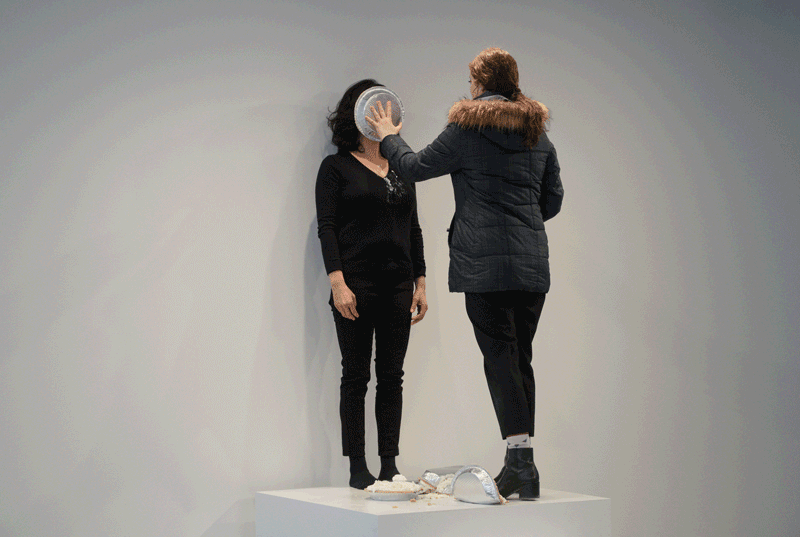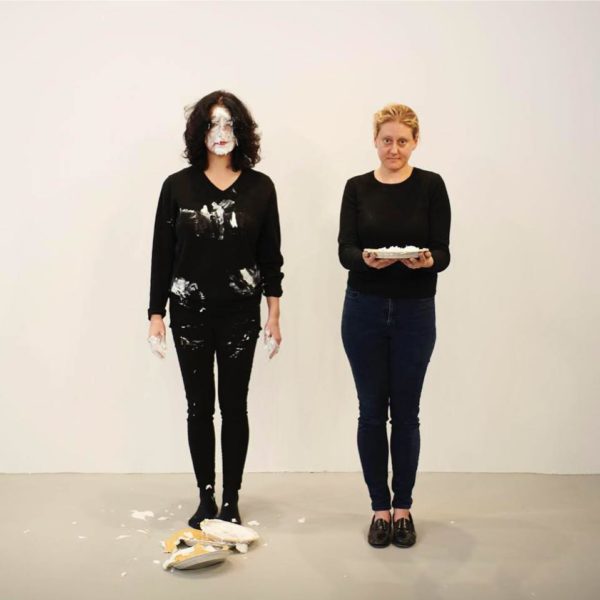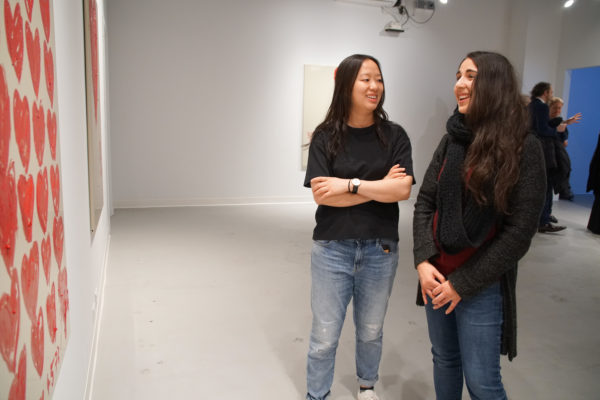
One evening in March, students from FIT’s Art Market Studies MA program gathered in the new namesake gallery of Meredith Rosen ’10 to smash pies in an artist’s face. The artist, Jennifer Rubell, orchestrated this masochistic destruction of dessert for a 30-minute performance piece entitled “Consent.” At the appointed hour, Rubell, wearing head-to-toe black, mounted a platform behind stanchions and several rows of cream pies.
Silence. For long minutes, no one moved. What promised, in descriptions of the piece, to be hilarious, seemed sober, even somber. The students and other audience members whispered together. “I’m too chicken,” one woman said. “It just seems so sadistic,” her friend replied. To wield a pie, participants had to sign a three-page legal waiver that included specifications for how to handle them—smashed, not thrown, for example. Multiple meanings of “Consent” slowly dawned on everyone.

At last, a woman in a stylish coat carried a pie up the platform stairs; she smeared it in Rubell’s face, clumsily dropped the remains, and fled. More silence. Another pie got smooshed. The third actor was a man. “I’ve waited my whole life to do this,” he told Rubell, “or to have it done to me.” He shoved the pie in the artist’s face; she rocked back, face slathered, and slowly righted herself. A golf ball–sized dollop of cream fell from her sweater to the floor with a plop.

Student Yiyan Liu ’18 also struck Rubell. “It was a little awkward,” Liu said afterward. “At the moment I did it, I said, ‘Sorry,’ because I hit her hard, and the pie was heavy.” Liu, who hopes to create a nonprofit that organizes collaborations between American and Chinese artists, said the piece “is ‘about’ how far the audience will go.” Kristal Viera ’18 was equally discomfited. “I didn’t want to hurt the artist,” she said, though she liked the work: “I think it’s about how people don’t know how to ask for consent.”
“It’s interesting how the themes being explored here connect to the MeToo movement,” said Art Market Studies Chair Natasha Degen. The performance was a teachable moment for the students, she said, for more than its political implications: “We look at how art is transacted and circulated” in the program. “A gallery is a commercial space, yet a performance is not easily commodified.” Outside the gallery’s performance space, Rosen was exhibiting a number of Rubell’s paintings. “Given their impermanence, performances are inherently newsworthy, and thus effective at drawing attention to more salable art,” Degen explained.
Rubell was the first artist to appear in Rosen’s 34th Street gallery, which opened February 8, garnering favorable notices in Artsy, Artnet, and The Daily Beast, among others. (Noted gallerist and curator Jeffrey Deitch signed the guest book on the day of the event.) “I want to bring the best art to the table, really push the limits of what’s being done now,” Rosen said. In 2014, she co-founded Sargent’s Daughters, a gallery on the Lower East Side, but she’s thrilled to have her own venture. “I’m not just interested in feminist art or performance art,” she said. “I’ll show every medium. I want everything.”
Rubell’s performance raised questions large and small. “I got to taste a pie,” said Patricia Daher ’18. “It wasn’t whipped cream, it was vanilla something, and it was pretty hard. Why did she choose that medium?”
